
The Cromwell chafer beetle is a species of flightless beetle in the family Scarabaeidae. It is found in just one spot in Central Otago, New Zealand, which is now a nature reserve. The population of the “Cromwell chafer beetle” is 13 as of 2023.

Xylotoles costatus, the Pitt Island longhorn beetle, is a species of beetle in the family Cerambycidae. It is endemic to the Chatham Islands. Once thought to be extinct, it is now known to survive on South East Island/Rangatira; being therefore an example of a so-called "Lazarus taxon".
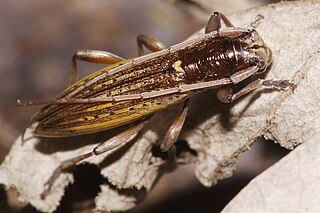
Xylotoles is a genus of flat-faced longhorns in the beetle family Cerambycidae. There are more than 15 described species in Xylotoles found mainly in New Zealand, Australia, and surrounding islands.
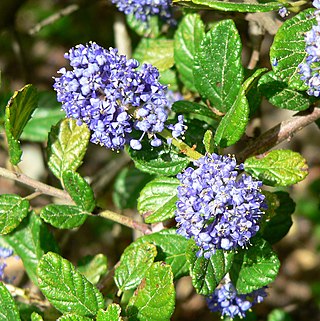
Ceanothus griseus is a species of flowering shrub known by the common names Carmel ceanothus and Carmel creeper. 'Carmel' refers to the Carmel-by-the-Sea region in California.
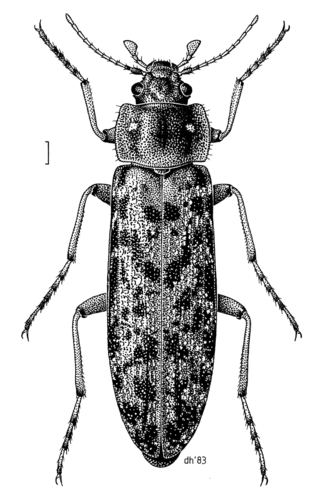
The Chalcodryidae are a family of beetles in the superfamily Tenebrionoidea. It contains at least five species in two genera Chalcodrya and Philpottia, which are endemic to New Zealand. They are generally found associated with moss or lichen covered branches, with the larvae having been found to be associated with dead twigs. They are likely noctural, feeding on lichen and other plant material at night. The genera Sirrhas and Onysius, formerly placed in this family, have subsequently been transferred to Promecheilidae.

Thomas Broun was a Scottish-born soldier, farmer, teacher and entomologist, who spent much of his career in New Zealand. He is known for his study of the beetles (Coleoptera) of New Zealand.
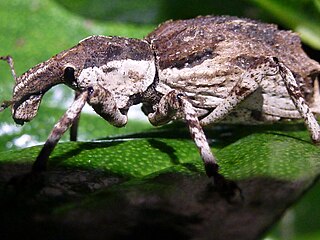
Anagotus stephenensis, commonly known as the ngaio weevil, is a large flightless weevil that is only found on Stephens Island in New Zealand. The ngaio weevil was discovered in 1916 by A.C. O'Connor on Stephens Island. Thomas Broun described it in 1921 as Phaeophanus oconnori after its collector. The weevils were observed at the time to be 'feeding on tall fescue and the leaves of trees'.
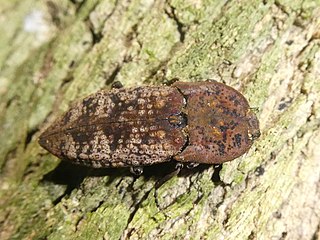
Amychus granulatus, commonly known as the Cook Strait click beetle, is a large flightless click beetle in the family Elateridae.
Xylotoles aegrotus is a species of beetle in the family Cerambycidae. It was described by Bates in 1874. It is known from New Zealand.
Xylotoles apicalis is a species of longhorned beetle in the family Cerambycidae, found in New Zealand.
Xylotoles pattesoni is a species of beetle in the family Cerambycidae. It was described by Olliff in 1888. It is known from Australia and New Zealand.
Xylotoles traversii is a species of beetle in the family Cerambycidae. It was described by Pascoe in 1876. It is known from New Zealand.
Somatidia convexa is a species of beetle in the family Cerambycidae. It was described by Broun in 1893. It is known from New Zealand. It contains the varietas Somatidia convexa var. sericophora.
Somatidia flavidorsis is a species of beetle in the family Cerambycidae. It was described by Broun in 1917. It is known from New Zealand.

Geodorcus ithaginis, the Mokohinau stag beetle, is a large flightless species of stag beetle in the family Lucanidae. It was described by Thomas Broun in 1893 after being discovered in the Mokohinau Islands by Andreas Stewart Sandager, a lighthouse keeper on the islands. The species survives only on the small unnamed island "Stack H", in a patch of vegetation the size of a living room, and is in extreme danger of extinction.
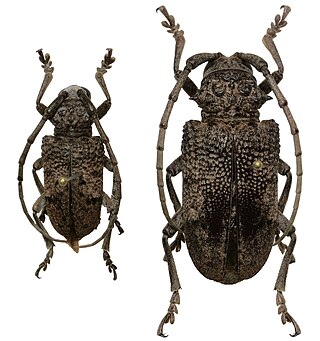
Phryneta spinator, the fig-tree borer longhorn beetle or fig tree borer, is a species of beetle in the family Cerambycidae. It was described by Johan Christian Fabricius in 1792, originally under the genus Lamia. It has a wide distribution throughout Africa. It feeds on Pyrus communis, Ficus carica, Salix babylonica, Cupressus sempervirens, and Vitis vinifera.
Hybolasius genalis is a species of beetle in the family Cerambycidae. It was described by Broun in 1903. It is known from New Zealand. It contains the varietas Hybolasius genalis var. tumidellus.
Hybolasius parvus is a species of beetle in the family Cerambycidae. It was described by Broun in 1880. It is known from New Zealand. It contains the varietas Hybolasius parvus var. pusillus.
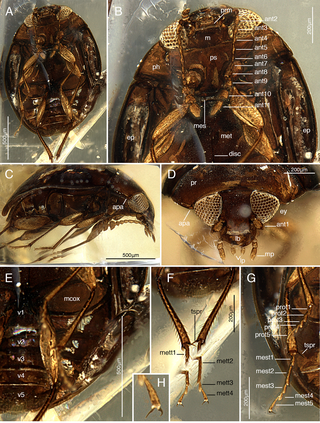
Cyclaxyridae are a family of beetles in the superfamily Cucujoidea. The only living genus is Cyclaxyra, with two species endemic to New Zealand. Other species have been named from fossils. They are also known as sooty mould beetles due to the association of Cyclaxyra with sooty mould. The extant species are mycophagous, feeding on spores, conidia, and hyphae.

Eucolaspis is a genus of leaf beetles in the subfamily Eumolpinae. It is native to New Zealand, where it is a serious pest of apple trees and other fruit crops. The genus has also been reported from Fiji.













